Both plaque and tartar increase the risk of cavities, gingivitis, and other dental conditions. Knowing how to distinguish between plaque and tartar can help identify the warning signs of dental health issues.
Understanding Plaque and tartar
What’s plaque?
What’s plaque? Dental plaque is something we all have on our teeth. This soft, sticky film builds up on your teeth after bacteria mixes with saliva and food.
According to the American Dental Association (ADA), plaque contains more than 500 species of bacteria, some good and some not so good for your mouth.
Harmful bacteria produce acids after you eat or drink. This is especially the case when you eat or drink something sugary. These acids attack the enamel on your teeth which, according to the Office of Disease Prevention and Health Promotion, can lead to more serious issues for both your dental and overall health.
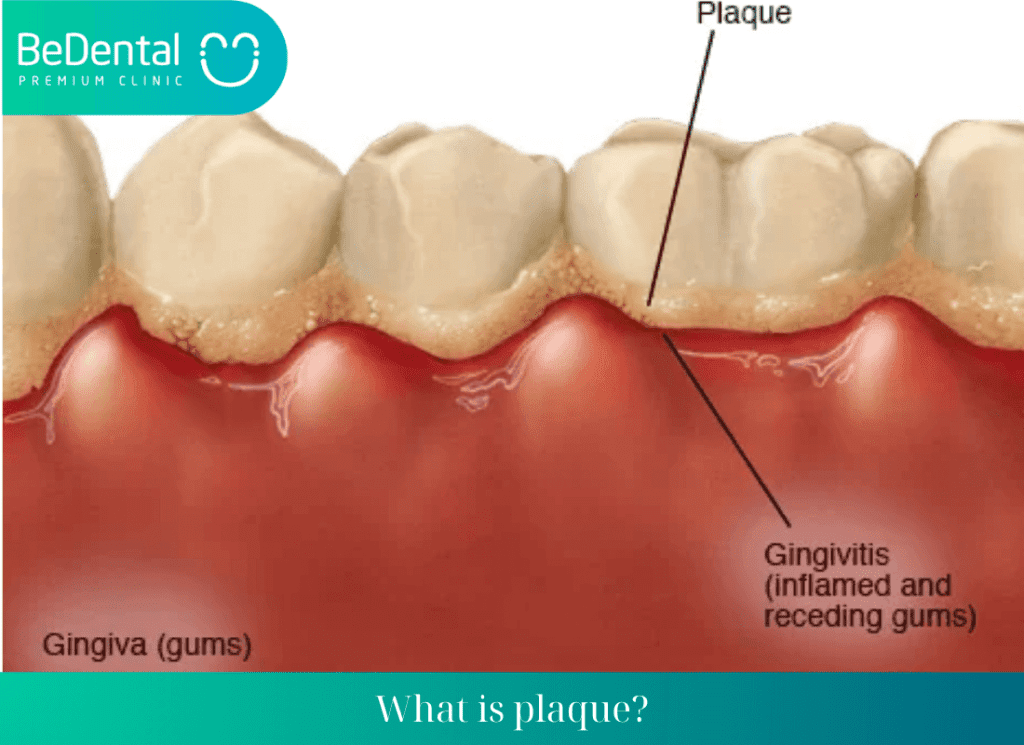
If plaque isn’t removed, it can harden on your teeth and turn into calculus, otherwise known as tartar. This buildup of plaque and tartar can cause your gums to become tender and swollen, which is an early stage of periodontal or gum disease.
To prevent plaque buildup, it’s important to:
- Brush your teeth at least twice a day
- Floss every day
- Limit sugary foods and drinks, or brush your teeth after consuming sugary goods
- See a dentist every 6 months for a checkup and routine cleaning
See more: What to do with black tartar?
Plaque removal
Regular brushing and flossing can help with plaque removal . To eliminate all plaque, a person must be thorough, as it tends to accumulate between the teeth and sometimes on the gums. If a person already has gum disease, gum swelling can create pockets where more plaque can hide.
Regular dental appointments can help with plaque removal, as dental cleaning may find plaque a person misses. Dental scaling removes plaque beneath the gums, where it may cause inflammation and harden into tartar.
Some signs of plaque on the teeth include:
- Chronic bad breath, since the bacteria that form plaque may smell
- Teeth that feel fuzzy or slimy
- White or yellow goo on dental floss
- Bleeding or painful gums
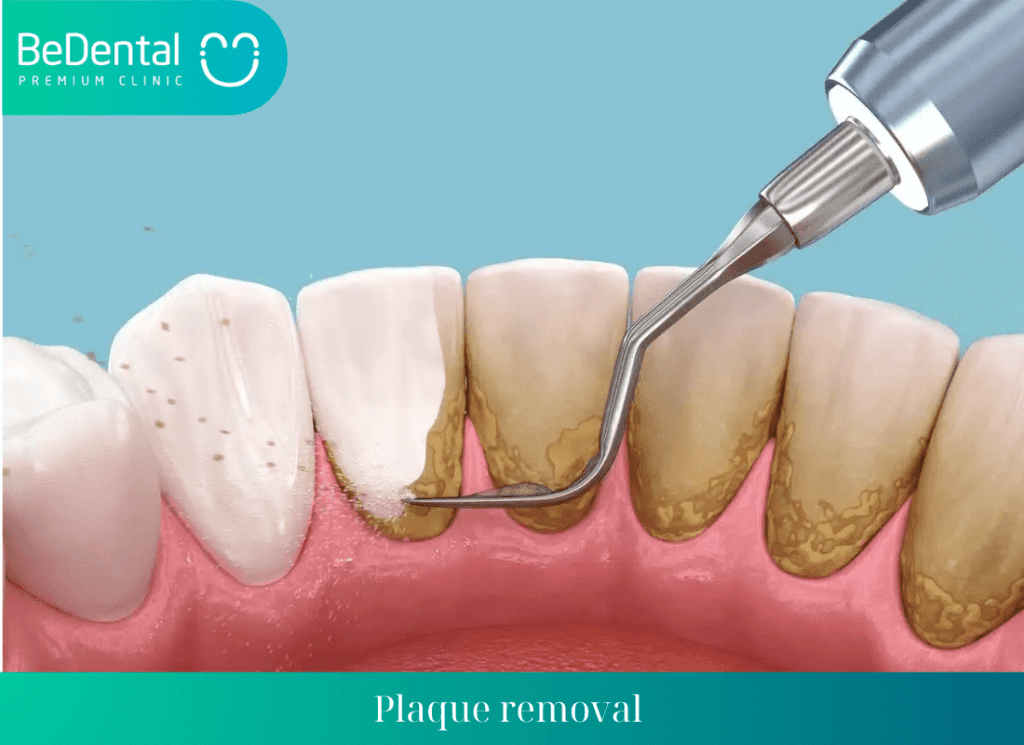
A toothpaste with fluoride can reduce dental harm from bacteria and plaque. Eating less sugar may also help, as the bacteria that forms plaque feeds on sugar. People with significant plaque or a history of tooth decay may choose a fluoride treatment at the dentist.
A person’s risk of developing plaque and gum disease is higher due to the following factors:
- Not brushing or flossing teeth regularly
- Having genetic risk factors for tooth decay
- Smoking
- Having certain lifestyle risk factors, such as eating a high-sugar diet or having very high stress
- Not seeking regular dental care, since a dentist can remove plaque a person cannot reach
- Wearing oral appliances, such as braces or retainers, that make it more difficult to clean the teeth thoroughly
See more: The difference between plaque and tartar
What’s tartar?
What’s tartar? Tartar — also called calculus — is made up of plaque and minerals from your saliva. Tartar can build up on teeth and attack the gum line. Tartar is a hard coating on the teeth. Because it’s porous, food and drink can easily leave tartar in your mouth.
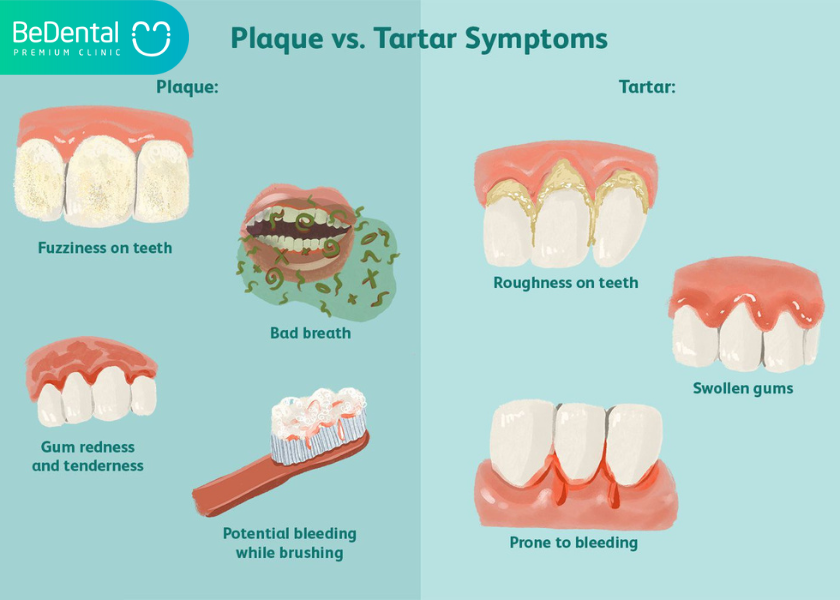
Tartar deposits are usually yellow or brown in color and form behind or between teeth. Tartar forms when plaque remains on teeth for an extended period of time, and both can be harmful to your oral health.
Tartar and plaque can:
- Causes bad breath, from poor oral hygiene.
- Destroy enamel, lead to tooth sensitivity, cavities, and even tooth loss.
- Increase risk of gum disease.
The frequency of tartar removal
The ADA now states that the frequency of dental visits should be dependent on your oral health. However, many dentists recommend having a dental cleaning and checkup every six months even when you feel your teeth are healthy. If you’re prone to plaque or tartar buildup, you’ll require more regular cleanings.
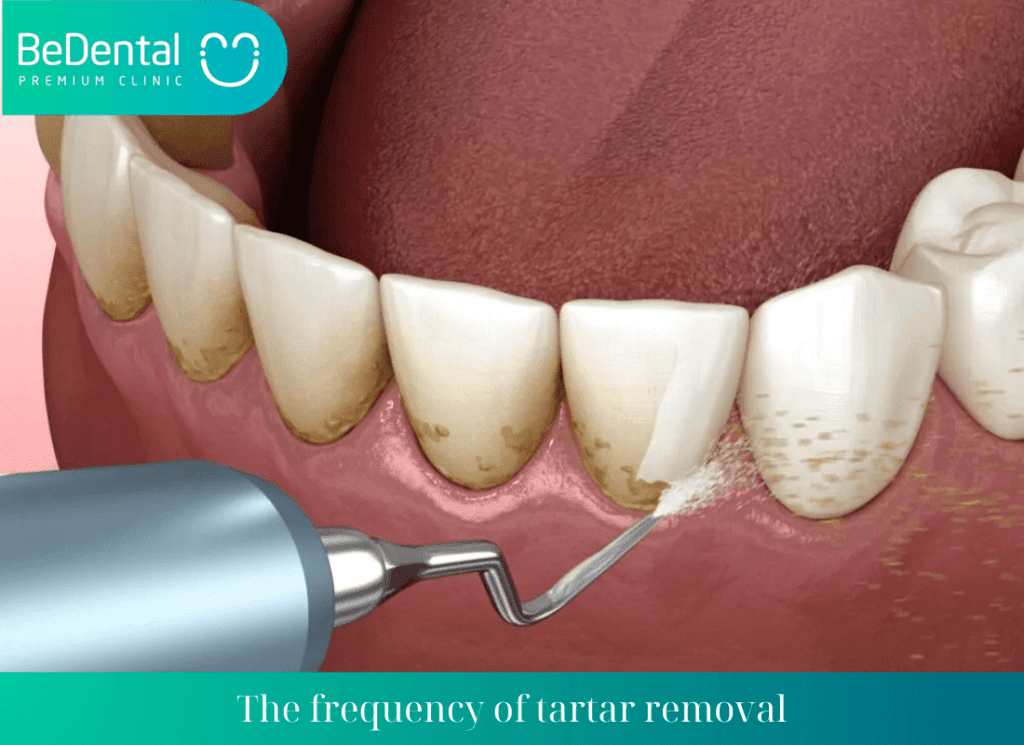
Some cases need cleanings more often include:
- Dry mouth, often comes from medications or getting older. While saliva contains bacteria, it also aids in the removal of debris.
- Lack the physical dexterity to thoroughly brush their teeth.
- Be prevented from fully understanding or completing a dental hygiene routine.
Tartar Removal and Prevention
Proper tartar removal and prevention are crucial for maintaining a healthy smile. Here are some strategies:
- Professional Dental Cleanings: Regular visits to the dentist for professional cleanings are essential for tartar removal. Dental professionals use specialized tools to scrape off the hardened tartar from your teeth, leaving them clean and smooth.
- Brushing and Flossing: Maintaining good oral hygiene at home is key to preventing tartar formation. Brush your teeth at least twice a day using a soft-bristled toothbrush and fluoride toothpaste. Be sure to brush all surfaces of your teeth and along the gum line. Floss daily to remove plaque and food particles from between your teeth.
- Proper Technique: Use gentle, circular motions when brushing to effectively remove plaque and prevent its hardening into tartar. Angle your toothbrush towards the gum line to clean thoroughly. Pay attention to the back teeth and hard-to-reach areas.
- Tartar Control Toothpaste: Consider using toothpaste specifically formulated to help control tartar. These toothpastes often contain ingredients that can inhibit the build-up of tartar and may help slow its formation.
- Mouthwash: Rinse your mouth with an antimicrobial mouthwash to help kill bacteria and reduce plaque formation. Look for a mouthwash that specifically targets tartar control.
- Dental Tools: Some individuals may choose to use dental tools, such as dental scalers or picks, at home to remove visible tartar. However, it is important to exercise caution and seek guidance from a dental professional to avoid causing damage to the teeth or gums.
- Healthy Lifestyle Habits: Maintain a balanced diet and limit sugary and acidic foods, as they can contribute to plaque formation. Quit smoking, as it increases the risk of tartar build-up and gum disease.
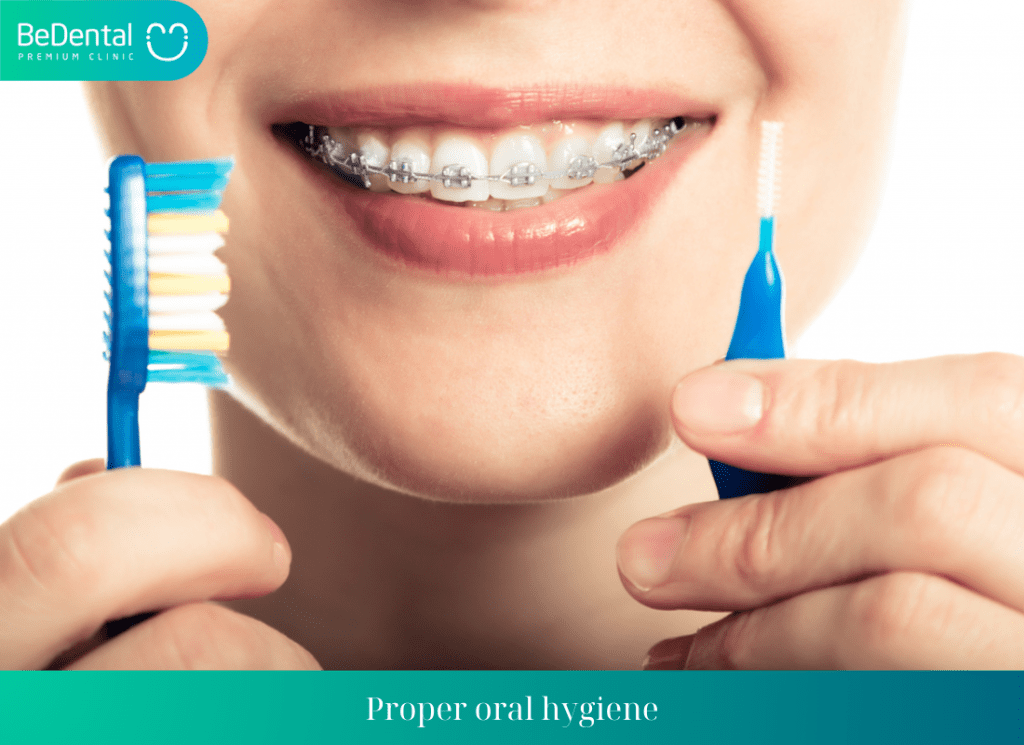
Remember, while these strategies can help with tartar removal and prevention, it is crucial to visit your dentist regularly for professional cleanings and comprehensive oral examinations. Your dentist can assess your oral health, identify any signs of tartar or gum disease, and provide personalized recommendations for maintaining a healthy smile.
What is scaling and polishing?
Dental scaling and polishing is the process of removing plaque and tartar buildup around the teeth and the polishing of the smooth surfaces of the teeth. When visiting the dentist for routine cleaning (prophylaxis), this technique is carried out.
Everyone should brush their teeth at least twice a day and ideally rinse with mouthwash after meals to keep their teeth healthy. However, plaque and tartar still have a chance to develop in some situations.
This occurs as a result of a bacterial film in the mouth and on the teeth. Calcium is a mineral found in saliva that teeth require to stay strong and healthy. As soon as you consume food, the food will turn into starch or sugar, which combines with bacteria and increases the acid concentration in your mouth. This environment can discolor the enamel and probably destroy the roots.
Therefore, brushing your teeth and having deeper dental cleaning such as scaling and polishing is the best protection against plaque and tartar.
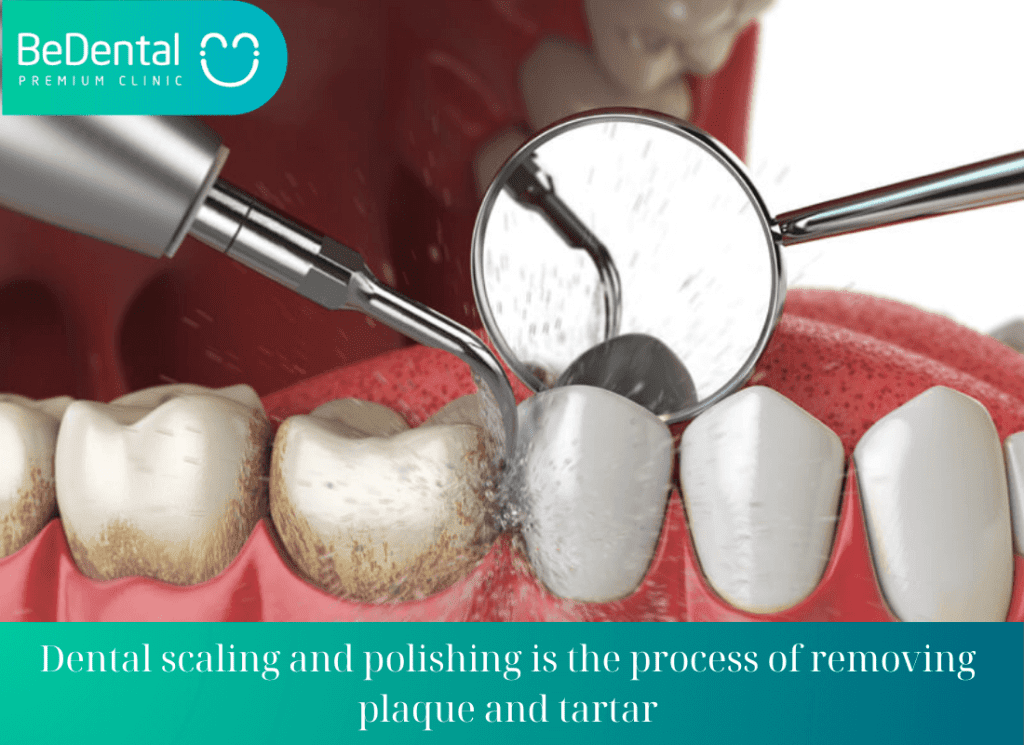
While scaling is a surface tooth treatment, sometimes it can be done on the roots, especially when periodontal pockets have already developed. This occurs when the germs have already extended to the gums. This procedure is called root planing.
On the other hand, polishing smooths the teeth, which can leave them feeling rough. During the procedure, the dentist may apply a small amount of fluoride as a protective barrier.
For the past few years, experts have discussed the importance of polishing. Some of them believe that it just should be done when it is extremely necessary. Moreover, the teeth should not be served with too much abrasive equipment to prevent damage. As a result, before you undergo scaling and polishing, the dentist will explain all of the benefits and drawbacks.
Vietnam’s Best Dentist for Scaling and Polishing
BeDental will be the best choice for those who want to experience the top-notch facilities and qualified dentist.
BeDental was established in 2012. After a period of operation, the center quickly became a popular address for providing dental services and a leader of the dentistry field. With highly trained dental professionals, the latest facilities including a 3D Scan CT scanner, Panorama and Cephalo X-ray machines, a laser teeth whitening system, etc, and advanced technology, BeDental is going to become the best dentistry center in Vietnam.
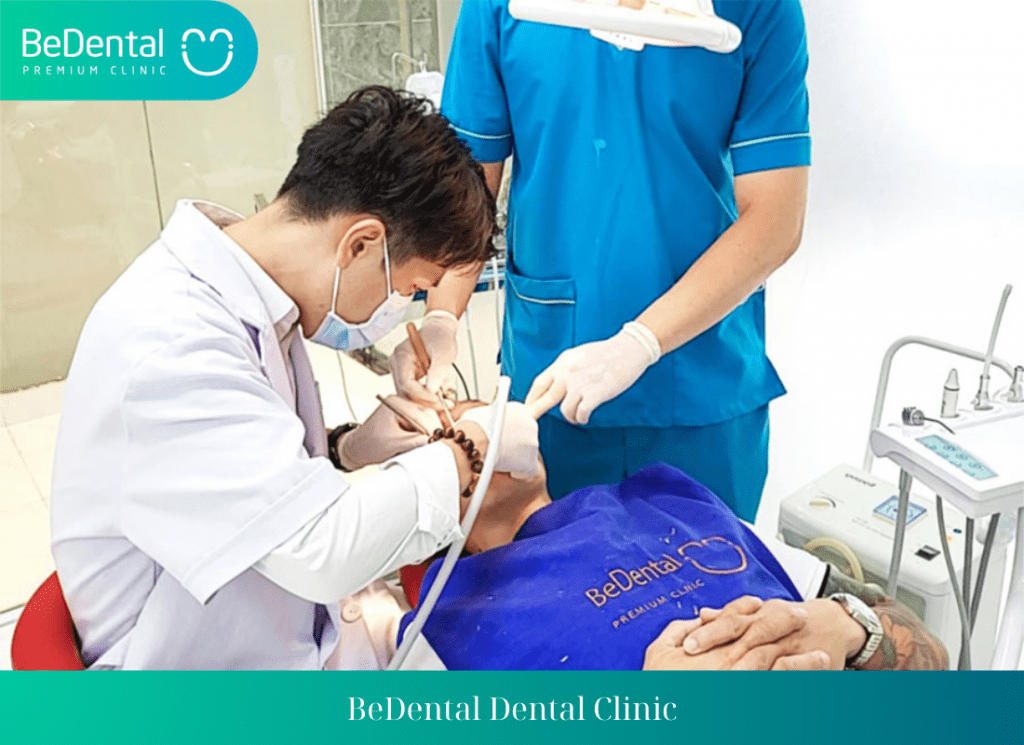
BeDental was established with the mission “Sow smile, spread success”, and believe that everyone deserves to have a charming and confident smile. That’s why Be tried their best to solve the dental problems or obstacles that hide your stunning smile.
With the best dental professionals in Vietnam, BeDental brings devotion and dedication to every customer as if we were family. BeDental is a reputable and professional dental system with various branches in city centers, which helps customers treat plaque and tartar easily.





